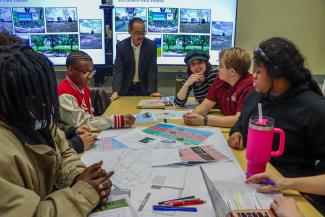July 8, 2024
We’re delighted to now announce the arrival of Dr. Theodore Lim to SCARP, our new Associate Professor in Policy and Community Engagement for Urban Transformation!
With Dr. Lim’s arrival, the School’s initiative to develop its faculty body with extraordinary minds in new positions is complete.
Our search to fill this new position sought someone with particular expertise in innovative approaches to policy and / or community engagement as the basis for transformative change. Having defined this inquiry broadly, we were keen to receive Lim’s lens on the subject.
More about Theodore Lim
Dr. Lim has a unique perspective that allows him to serve as an effective bridge between disciplines and when connecting with communities. He describes that his extended background brought him full circle in his work, interests, and values after experiencing many different contexts, epistemologies, and value-systems.
Lim received his PhD in City and Regional Planning from the University of Pennsylvania, a master of science in Environmental Engineering from Tsinghua University (China), and a bachelor’s degree in Immigrant Studies from Swarthmore College. From 2019 – 2024, he was an assistant professor of urban affairs and planning at Virginia Tech’s School of Public and International Affairs.
While at Virginia Tech, he was the Principal Investigator on research projects funded by the US National Science Foundation and the US National Oceanic and Atmospheric Administration, totaling ~ 2 million USD.
He’s also a recipient of the CAREER award, a prestigious and competitive award in the USA from the National Science Foundation.
Outside academia, Theo has worked in community organizing, civil and environmental engineering and infrastructure planning, public health, and in the agriculture technology industry. He enjoys running, riding bikes, and writing/doodling with fountain pens.
Dr. Lim’s research inquiries
The purpose of Theo’s research is to ensure information and knowledge are used to create healthy, just, and inclusive futures for the most marginalized in society amidst a period of accelerating global environmental and technological change. His research has two main emphases: (1) how data and models are used in environmental policy and planning contexts; and (2) how to engage with community around urban climate adaptation to achieve just outcomes. He uses diverse methods: including participatory action research, more traditional tools of qualitative social science, as well as quantitative socio-environmental systems simulation.

Theo’s research has been published in top-ranked journals in planning, including Journal of the American Planning Association, Landscape and Urban Planning, and Sustainable Cities & Society, as well as in environmental science and engineering journals, including Water Resources Research, and Environmental Science & Technology. The breadth of research outlets reflects his interdisciplinary academic training and professional experience, which has spanned from social and policy sciences and community organizing, to supercomputing, data science, and hydrological modeling.
The past several years, Theo has been engaged in an intensive participatory action research project in Roanoke, Virginia, related to urban heat mitigation efforts. The project takes a “trauma-informed, healing-centered” approach to planning with communities, and includes substantive involvement from youth in the definition of “community resilience” through arts, spirituality, and community science.
Most recently, he has received and has been leading a $1M NSF research project, “H.O.P.E. for Heat Resilience.” It is a large (dozens of organizations involved) participatory action research project that centers youth engagement in community resilience planning. The project is ongoing.
Read more about his research goings on in his own words:
The Black Experience of Urban Planning in Roanoke
H.O.P.E. for Heat Resilience high school students
Some recent media appearances:
“Roanoke project focuses on ‘heat islands”
(April 16, 2024) by Mark D. Robertson. Cardinal News.
“Harmful history of urban renewal”
(April 25, 2024) VPM News Focal Point. PBS. Season 3, Episode 9. 5m 39s.
On arriving at SCARP, Dr. Lim remarks:
It is a privilege to join SCARP, which has both such a deep history of intellectual leadership in progressive planning, and also so much new energy. I really look forward to getting to know the students and colleagues here, as well as orienting myself to a new city and country.